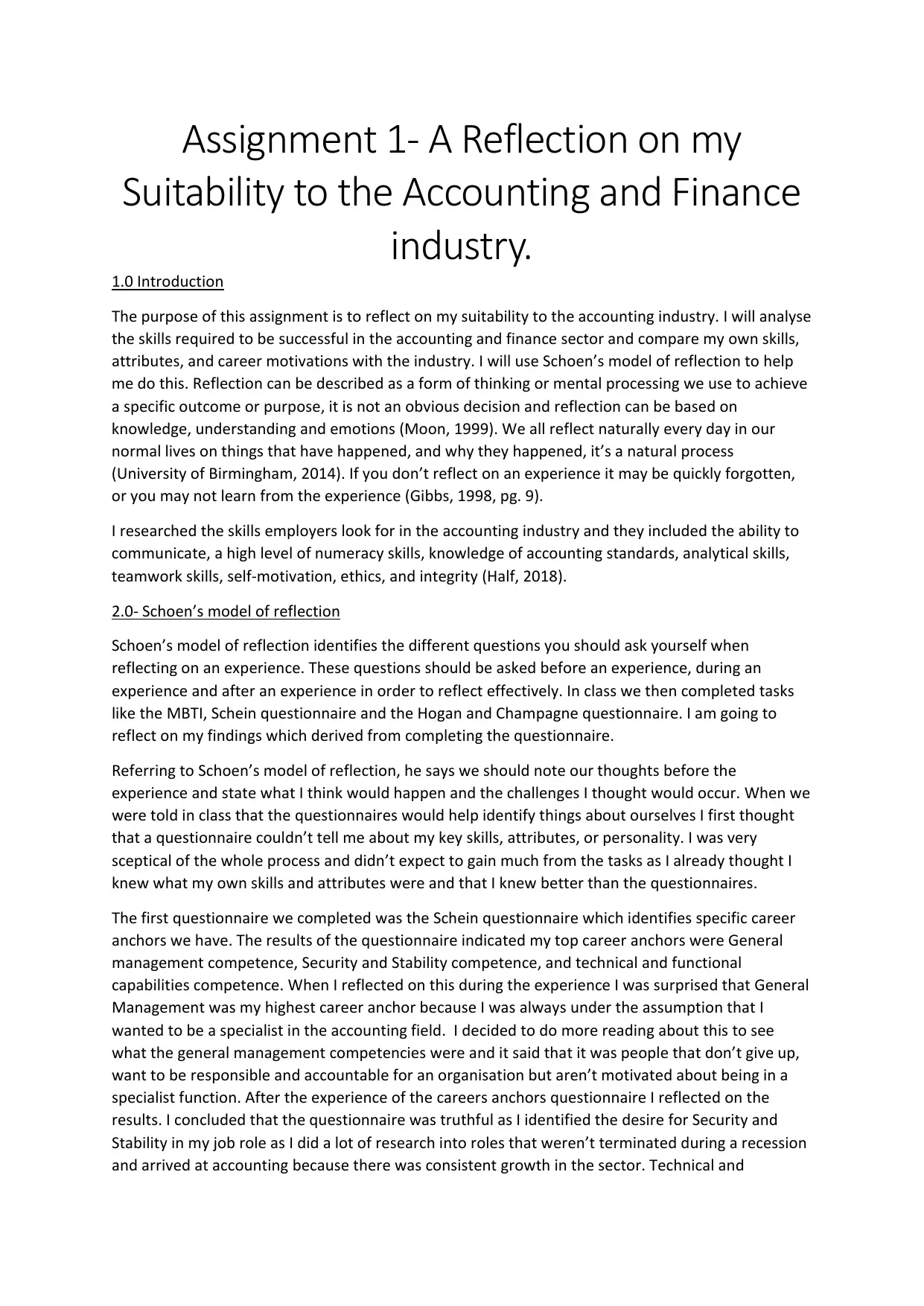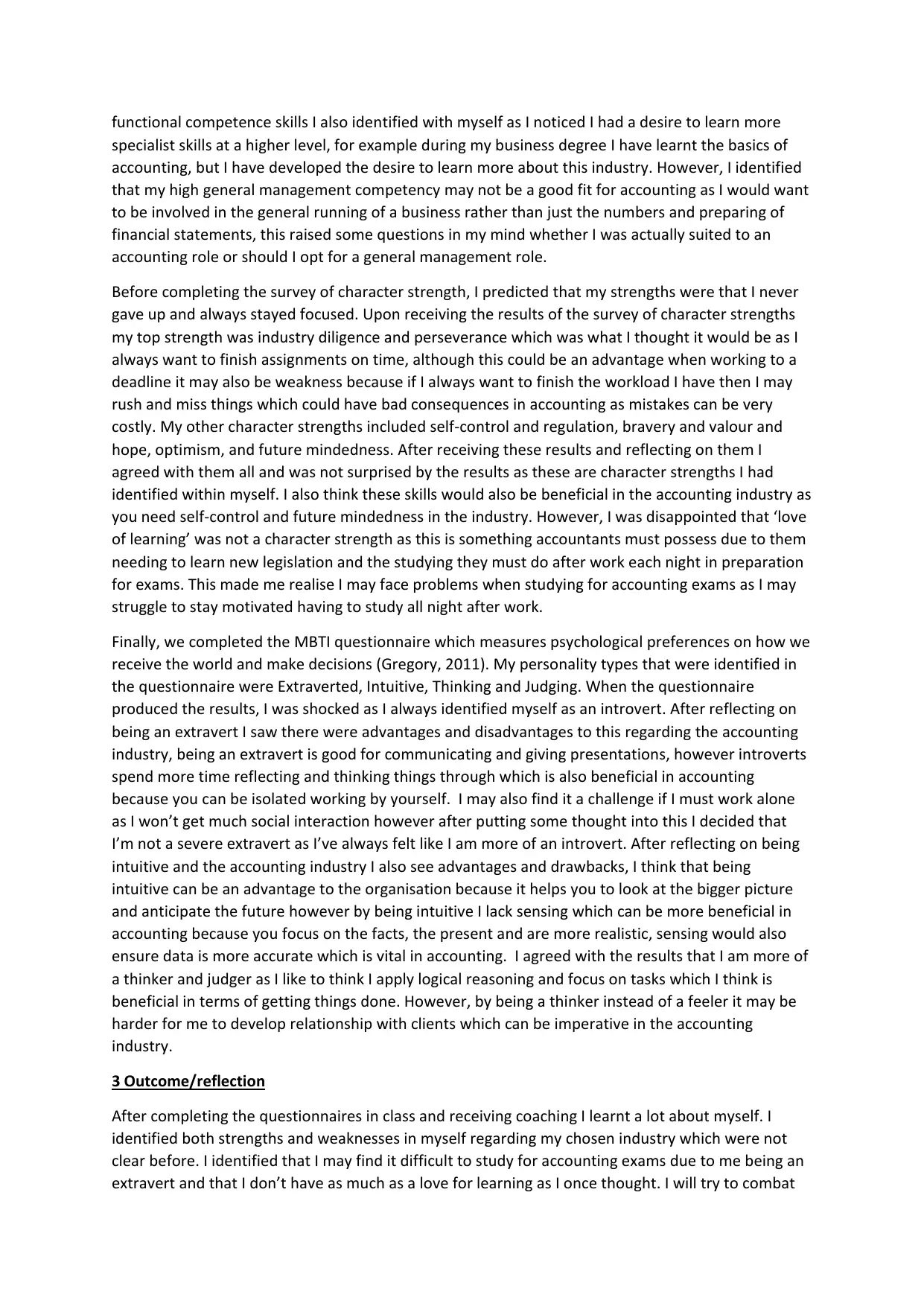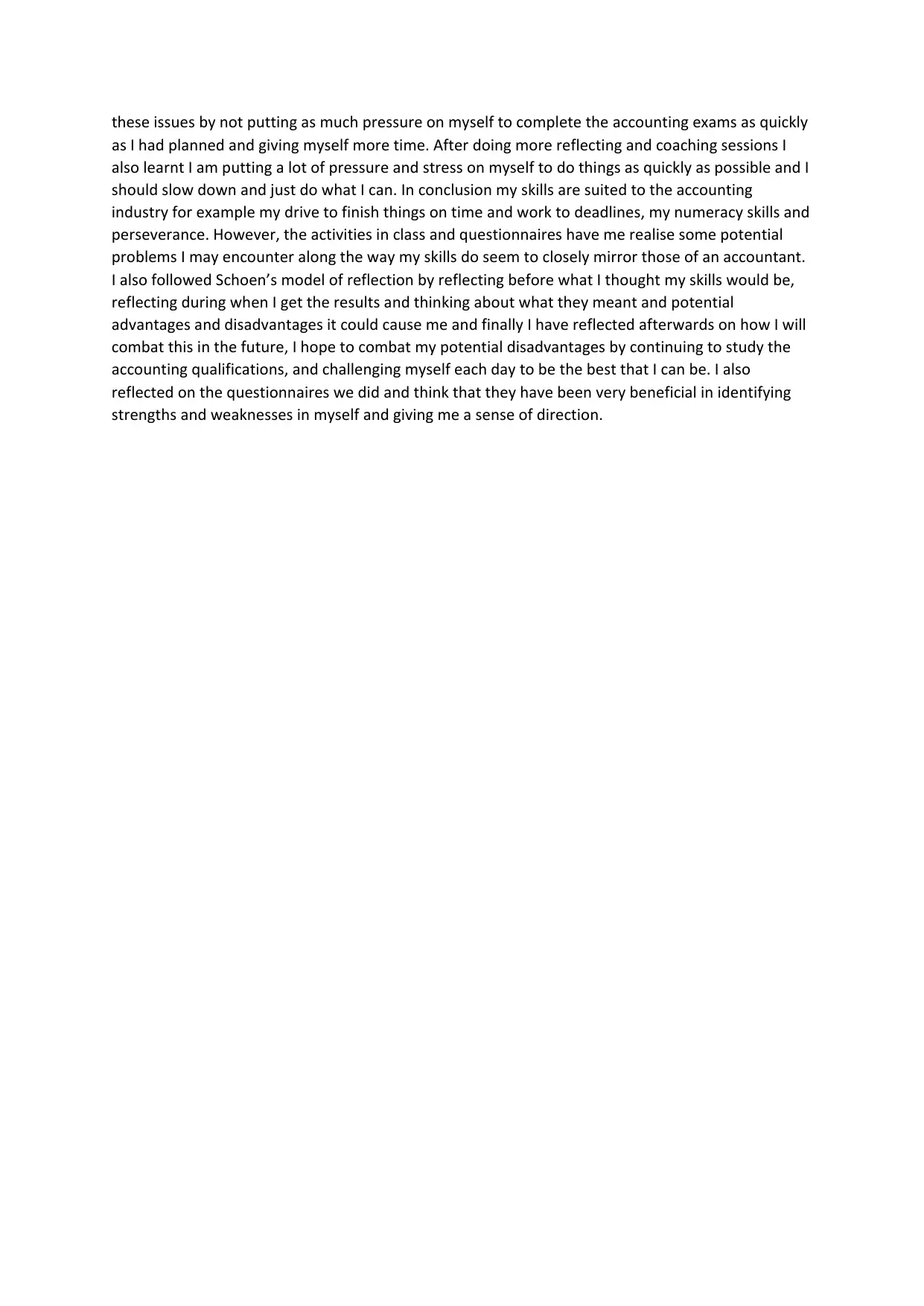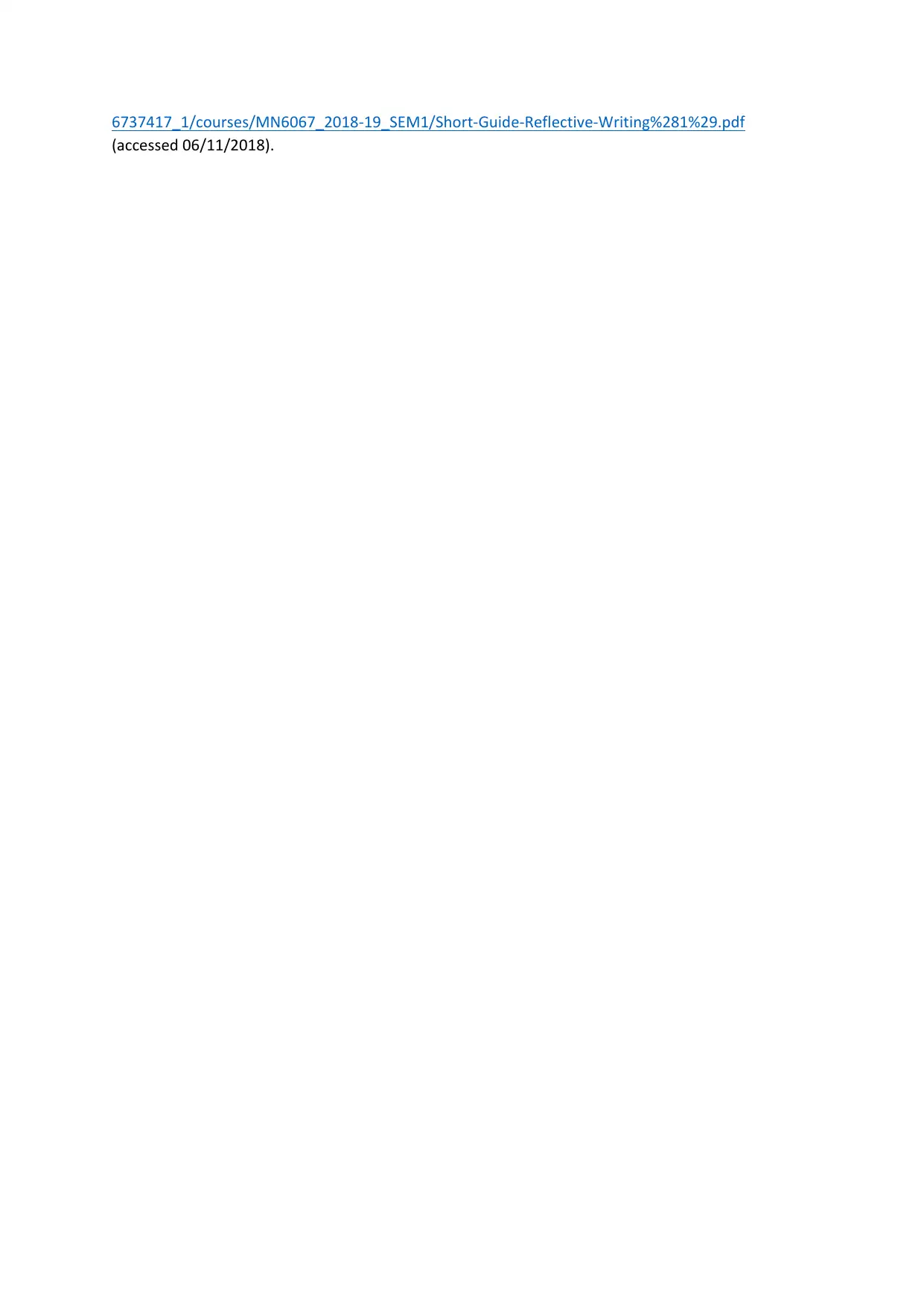Assignment 1: A Reflection on My Suitability to Accounting and Finance
VerifiedAdded on 2021/03/22
|5
|1961
|151
Report
AI Summary
This assignment is a reflective report analyzing a student's suitability for a career in the accounting and finance industry. The student utilizes Schoen's model of reflection to assess their skills, attributes, and career motivations in comparison to industry requirements. The report details the student's experiences with various questionnaires, including the Schein questionnaire for career anchors, a survey of character strengths, and the MBTI personality test. The student reflects on their initial expectations, the results obtained, and the implications of these findings. The analysis covers strengths such as perseverance and numeracy skills, as well as potential challenges related to extraversion and a perceived lack of 'love of learning'. The report concludes with an overall assessment of the student's suitability, highlighting areas for personal development and strategies for addressing potential weaknesses, such as managing study habits and adapting to the demands of accounting exams. References used in the report include sources from ACCA, Accountingweb.co.uk, ICAEW, and others.

Assignment 1- A Reflection on my
Suitability to the Accounting and Finance
industry.
1.0 Introduction
The purpose of this assignment is to reflect on my suitability to the accounting industry. I will analyse
the skills required to be successful in the accounting and finance sector and compare my own skills,
attributes, and career motivations with the industry. I will use Schoen’s model of reflection to help
me do this. Reflection can be described as a form of thinking or mental processing we use to achieve
a specific outcome or purpose, it is not an obvious decision and reflection can be based on
knowledge, understanding and emotions (Moon, 1999). We all reflect naturally every day in our
normal lives on things that have happened, and why they happened, it’s a natural process
(University of Birmingham, 2014). If you don’t reflect on an experience it may be quickly forgotten,
or you may not learn from the experience (Gibbs, 1998, pg. 9).
I researched the skills employers look for in the accounting industry and they included the ability to
communicate, a high level of numeracy skills, knowledge of accounting standards, analytical skills,
teamwork skills, self-motivation, ethics, and integrity (Half, 2018).
2.0- Schoen’s model of reflection
Schoen’s model of reflection identifies the different questions you should ask yourself when
reflecting on an experience. These questions should be asked before an experience, during an
experience and after an experience in order to reflect effectively. In class we then completed tasks
like the MBTI, Schein questionnaire and the Hogan and Champagne questionnaire. I am going to
reflect on my findings which derived from completing the questionnaire.
Referring to Schoen’s model of reflection, he says we should note our thoughts before the
experience and state what I think would happen and the challenges I thought would occur. When we
were told in class that the questionnaires would help identify things about ourselves I first thought
that a questionnaire couldn’t tell me about my key skills, attributes, or personality. I was very
sceptical of the whole process and didn’t expect to gain much from the tasks as I already thought I
knew what my own skills and attributes were and that I knew better than the questionnaires.
The first questionnaire we completed was the Schein questionnaire which identifies specific career
anchors we have. The results of the questionnaire indicated my top career anchors were General
management competence, Security and Stability competence, and technical and functional
capabilities competence. When I reflected on this during the experience I was surprised that General
Management was my highest career anchor because I was always under the assumption that I
wanted to be a specialist in the accounting field. I decided to do more reading about this to see
what the general management competencies were and it said that it was people that don’t give up,
want to be responsible and accountable for an organisation but aren’t motivated about being in a
specialist function. After the experience of the careers anchors questionnaire I reflected on the
results. I concluded that the questionnaire was truthful as I identified the desire for Security and
Stability in my job role as I did a lot of research into roles that weren’t terminated during a recession
and arrived at accounting because there was consistent growth in the sector. Technical and
Suitability to the Accounting and Finance
industry.
1.0 Introduction
The purpose of this assignment is to reflect on my suitability to the accounting industry. I will analyse
the skills required to be successful in the accounting and finance sector and compare my own skills,
attributes, and career motivations with the industry. I will use Schoen’s model of reflection to help
me do this. Reflection can be described as a form of thinking or mental processing we use to achieve
a specific outcome or purpose, it is not an obvious decision and reflection can be based on
knowledge, understanding and emotions (Moon, 1999). We all reflect naturally every day in our
normal lives on things that have happened, and why they happened, it’s a natural process
(University of Birmingham, 2014). If you don’t reflect on an experience it may be quickly forgotten,
or you may not learn from the experience (Gibbs, 1998, pg. 9).
I researched the skills employers look for in the accounting industry and they included the ability to
communicate, a high level of numeracy skills, knowledge of accounting standards, analytical skills,
teamwork skills, self-motivation, ethics, and integrity (Half, 2018).
2.0- Schoen’s model of reflection
Schoen’s model of reflection identifies the different questions you should ask yourself when
reflecting on an experience. These questions should be asked before an experience, during an
experience and after an experience in order to reflect effectively. In class we then completed tasks
like the MBTI, Schein questionnaire and the Hogan and Champagne questionnaire. I am going to
reflect on my findings which derived from completing the questionnaire.
Referring to Schoen’s model of reflection, he says we should note our thoughts before the
experience and state what I think would happen and the challenges I thought would occur. When we
were told in class that the questionnaires would help identify things about ourselves I first thought
that a questionnaire couldn’t tell me about my key skills, attributes, or personality. I was very
sceptical of the whole process and didn’t expect to gain much from the tasks as I already thought I
knew what my own skills and attributes were and that I knew better than the questionnaires.
The first questionnaire we completed was the Schein questionnaire which identifies specific career
anchors we have. The results of the questionnaire indicated my top career anchors were General
management competence, Security and Stability competence, and technical and functional
capabilities competence. When I reflected on this during the experience I was surprised that General
Management was my highest career anchor because I was always under the assumption that I
wanted to be a specialist in the accounting field. I decided to do more reading about this to see
what the general management competencies were and it said that it was people that don’t give up,
want to be responsible and accountable for an organisation but aren’t motivated about being in a
specialist function. After the experience of the careers anchors questionnaire I reflected on the
results. I concluded that the questionnaire was truthful as I identified the desire for Security and
Stability in my job role as I did a lot of research into roles that weren’t terminated during a recession
and arrived at accounting because there was consistent growth in the sector. Technical and
Paraphrase This Document
Need a fresh take? Get an instant paraphrase of this document with our AI Paraphraser

functional competence skills I also identified with myself as I noticed I had a desire to learn more
specialist skills at a higher level, for example during my business degree I have learnt the basics of
accounting, but I have developed the desire to learn more about this industry. However, I identified
that my high general management competency may not be a good fit for accounting as I would want
to be involved in the general running of a business rather than just the numbers and preparing of
financial statements, this raised some questions in my mind whether I was actually suited to an
accounting role or should I opt for a general management role.
Before completing the survey of character strength, I predicted that my strengths were that I never
gave up and always stayed focused. Upon receiving the results of the survey of character strengths
my top strength was industry diligence and perseverance which was what I thought it would be as I
always want to finish assignments on time, although this could be an advantage when working to a
deadline it may also be weakness because if I always want to finish the workload I have then I may
rush and miss things which could have bad consequences in accounting as mistakes can be very
costly. My other character strengths included self-control and regulation, bravery and valour and
hope, optimism, and future mindedness. After receiving these results and reflecting on them I
agreed with them all and was not surprised by the results as these are character strengths I had
identified within myself. I also think these skills would also be beneficial in the accounting industry as
you need self-control and future mindedness in the industry. However, I was disappointed that ‘love
of learning’ was not a character strength as this is something accountants must possess due to them
needing to learn new legislation and the studying they must do after work each night in preparation
for exams. This made me realise I may face problems when studying for accounting exams as I may
struggle to stay motivated having to study all night after work.
Finally, we completed the MBTI questionnaire which measures psychological preferences on how we
receive the world and make decisions (Gregory, 2011). My personality types that were identified in
the questionnaire were Extraverted, Intuitive, Thinking and Judging. When the questionnaire
produced the results, I was shocked as I always identified myself as an introvert. After reflecting on
being an extravert I saw there were advantages and disadvantages to this regarding the accounting
industry, being an extravert is good for communicating and giving presentations, however introverts
spend more time reflecting and thinking things through which is also beneficial in accounting
because you can be isolated working by yourself. I may also find it a challenge if I must work alone
as I won’t get much social interaction however after putting some thought into this I decided that
I’m not a severe extravert as I’ve always felt like I am more of an introvert. After reflecting on being
intuitive and the accounting industry I also see advantages and drawbacks, I think that being
intuitive can be an advantage to the organisation because it helps you to look at the bigger picture
and anticipate the future however by being intuitive I lack sensing which can be more beneficial in
accounting because you focus on the facts, the present and are more realistic, sensing would also
ensure data is more accurate which is vital in accounting. I agreed with the results that I am more of
a thinker and judger as I like to think I apply logical reasoning and focus on tasks which I think is
beneficial in terms of getting things done. However, by being a thinker instead of a feeler it may be
harder for me to develop relationship with clients which can be imperative in the accounting
industry.
3 Outcome/reflection
After completing the questionnaires in class and receiving coaching I learnt a lot about myself. I
identified both strengths and weaknesses in myself regarding my chosen industry which were not
clear before. I identified that I may find it difficult to study for accounting exams due to me being an
extravert and that I don’t have as much as a love for learning as I once thought. I will try to combat
specialist skills at a higher level, for example during my business degree I have learnt the basics of
accounting, but I have developed the desire to learn more about this industry. However, I identified
that my high general management competency may not be a good fit for accounting as I would want
to be involved in the general running of a business rather than just the numbers and preparing of
financial statements, this raised some questions in my mind whether I was actually suited to an
accounting role or should I opt for a general management role.
Before completing the survey of character strength, I predicted that my strengths were that I never
gave up and always stayed focused. Upon receiving the results of the survey of character strengths
my top strength was industry diligence and perseverance which was what I thought it would be as I
always want to finish assignments on time, although this could be an advantage when working to a
deadline it may also be weakness because if I always want to finish the workload I have then I may
rush and miss things which could have bad consequences in accounting as mistakes can be very
costly. My other character strengths included self-control and regulation, bravery and valour and
hope, optimism, and future mindedness. After receiving these results and reflecting on them I
agreed with them all and was not surprised by the results as these are character strengths I had
identified within myself. I also think these skills would also be beneficial in the accounting industry as
you need self-control and future mindedness in the industry. However, I was disappointed that ‘love
of learning’ was not a character strength as this is something accountants must possess due to them
needing to learn new legislation and the studying they must do after work each night in preparation
for exams. This made me realise I may face problems when studying for accounting exams as I may
struggle to stay motivated having to study all night after work.
Finally, we completed the MBTI questionnaire which measures psychological preferences on how we
receive the world and make decisions (Gregory, 2011). My personality types that were identified in
the questionnaire were Extraverted, Intuitive, Thinking and Judging. When the questionnaire
produced the results, I was shocked as I always identified myself as an introvert. After reflecting on
being an extravert I saw there were advantages and disadvantages to this regarding the accounting
industry, being an extravert is good for communicating and giving presentations, however introverts
spend more time reflecting and thinking things through which is also beneficial in accounting
because you can be isolated working by yourself. I may also find it a challenge if I must work alone
as I won’t get much social interaction however after putting some thought into this I decided that
I’m not a severe extravert as I’ve always felt like I am more of an introvert. After reflecting on being
intuitive and the accounting industry I also see advantages and drawbacks, I think that being
intuitive can be an advantage to the organisation because it helps you to look at the bigger picture
and anticipate the future however by being intuitive I lack sensing which can be more beneficial in
accounting because you focus on the facts, the present and are more realistic, sensing would also
ensure data is more accurate which is vital in accounting. I agreed with the results that I am more of
a thinker and judger as I like to think I apply logical reasoning and focus on tasks which I think is
beneficial in terms of getting things done. However, by being a thinker instead of a feeler it may be
harder for me to develop relationship with clients which can be imperative in the accounting
industry.
3 Outcome/reflection
After completing the questionnaires in class and receiving coaching I learnt a lot about myself. I
identified both strengths and weaknesses in myself regarding my chosen industry which were not
clear before. I identified that I may find it difficult to study for accounting exams due to me being an
extravert and that I don’t have as much as a love for learning as I once thought. I will try to combat

these issues by not putting as much pressure on myself to complete the accounting exams as quickly
as I had planned and giving myself more time. After doing more reflecting and coaching sessions I
also learnt I am putting a lot of pressure and stress on myself to do things as quickly as possible and I
should slow down and just do what I can. In conclusion my skills are suited to the accounting
industry for example my drive to finish things on time and work to deadlines, my numeracy skills and
perseverance. However, the activities in class and questionnaires have me realise some potential
problems I may encounter along the way my skills do seem to closely mirror those of an accountant.
I also followed Schoen’s model of reflection by reflecting before what I thought my skills would be,
reflecting during when I get the results and thinking about what they meant and potential
advantages and disadvantages it could cause me and finally I have reflected afterwards on how I will
combat this in the future, I hope to combat my potential disadvantages by continuing to study the
accounting qualifications, and challenging myself each day to be the best that I can be. I also
reflected on the questionnaires we did and think that they have been very beneficial in identifying
strengths and weaknesses in myself and giving me a sense of direction.
as I had planned and giving myself more time. After doing more reflecting and coaching sessions I
also learnt I am putting a lot of pressure and stress on myself to do things as quickly as possible and I
should slow down and just do what I can. In conclusion my skills are suited to the accounting
industry for example my drive to finish things on time and work to deadlines, my numeracy skills and
perseverance. However, the activities in class and questionnaires have me realise some potential
problems I may encounter along the way my skills do seem to closely mirror those of an accountant.
I also followed Schoen’s model of reflection by reflecting before what I thought my skills would be,
reflecting during when I get the results and thinking about what they meant and potential
advantages and disadvantages it could cause me and finally I have reflected afterwards on how I will
combat this in the future, I hope to combat my potential disadvantages by continuing to study the
accounting qualifications, and challenging myself each day to be the best that I can be. I also
reflected on the questionnaires we did and think that they have been very beneficial in identifying
strengths and weaknesses in myself and giving me a sense of direction.
⊘ This is a preview!⊘
Do you want full access?
Subscribe today to unlock all pages.

Trusted by 1+ million students worldwide

References
ACCA (2018)- The professional skills you need -
https://www.accaglobal.com/uk/en/student/sa/professional-skills/professional-skills.html (accessed
06/11/2018).
Accountingweb.co.uk (2018)- Deadline management - https://www.accountingweb.co.uk/any-
answers/deadline-management-0 (accessed 06/11/2018).
Fardon, M (2016)- AAT Level 2: Working effectively in Accounting and Finance, Tutorial- Osborne
Books
Gibbs, G (1988) - Learning by doing: a guide to teaching and learning methods. Oxford: Further
Education Unit, Oxford Polytechnic.
Gov.uk (2018)- Corporate Information: Working for HMRC-
https://www.gov.uk/government/organisations/hm-revenue-customs/about/recruitment (accessed
06/11/2018).
Gregory, A (2011)- https://www.sitepoint.com/what-the-myers-briggs-personality-test-can-and-
cant-tell-you/ (accessed 07/11/2018).
Half, R (2018)- Your career in finance- 10 skills that really count-
https://www.roberthalf.com.au/blog/jobseekers/your-career-finance-10-skills-really-count
(accessed 06/11/2018).
ICAEW (2018)- Ethics for accountants in business- https://www.icaew.com/international-accounting-
and-auditing/international-standards-ethics/ethics-for-accountants-in-business (accessed
06/11/2018).
Knapp, K (2018)- https://www.monster.ca/career-advice/article/finance-and-accounting-what-do-
employers-want (accessed 06/11/2018).
Moon, J (1999) - Reflection in Learning and Professional Development, Kogan Page: London.
PwC (2018)- Graduate Opportunities: Assurance - https://www.pwc.co.uk/careers/student-
jobs/work-for-us/graduateopportunities/assurance.html (accessed 06/11/2018).
Targetjobs.co.uk (2018) – Accountant: Job description - https://targetjobs.co.uk/careers-advice/job-
descriptions/276909-accountant-job-description (accessed 06/11/2018).
Targetcareers.co.uk (2018)- Skills and qualities you need for a finance apprenticeship -
https://targetcareers.co.uk/career-sectors/finance/186-skills-and-qualities-you-need-for-a-finance-
apprenticeship (accessed 06/11/2018).
UCAS (2018)- Job Profile: Accountant - https://www.ucas.com/ucas/after-gcses/find-career-
ideas/explore-jobs/job-profile/accountant (accessed 06/11/2018).
University of Birmingham (2014) - Library Services Academic Skills Centre- ‘A short guide to
reflective writing- https://bblearn.londonmet.ac.uk/bbcswebdav/pid-2390705-dt-content-rid-
ACCA (2018)- The professional skills you need -
https://www.accaglobal.com/uk/en/student/sa/professional-skills/professional-skills.html (accessed
06/11/2018).
Accountingweb.co.uk (2018)- Deadline management - https://www.accountingweb.co.uk/any-
answers/deadline-management-0 (accessed 06/11/2018).
Fardon, M (2016)- AAT Level 2: Working effectively in Accounting and Finance, Tutorial- Osborne
Books
Gibbs, G (1988) - Learning by doing: a guide to teaching and learning methods. Oxford: Further
Education Unit, Oxford Polytechnic.
Gov.uk (2018)- Corporate Information: Working for HMRC-
https://www.gov.uk/government/organisations/hm-revenue-customs/about/recruitment (accessed
06/11/2018).
Gregory, A (2011)- https://www.sitepoint.com/what-the-myers-briggs-personality-test-can-and-
cant-tell-you/ (accessed 07/11/2018).
Half, R (2018)- Your career in finance- 10 skills that really count-
https://www.roberthalf.com.au/blog/jobseekers/your-career-finance-10-skills-really-count
(accessed 06/11/2018).
ICAEW (2018)- Ethics for accountants in business- https://www.icaew.com/international-accounting-
and-auditing/international-standards-ethics/ethics-for-accountants-in-business (accessed
06/11/2018).
Knapp, K (2018)- https://www.monster.ca/career-advice/article/finance-and-accounting-what-do-
employers-want (accessed 06/11/2018).
Moon, J (1999) - Reflection in Learning and Professional Development, Kogan Page: London.
PwC (2018)- Graduate Opportunities: Assurance - https://www.pwc.co.uk/careers/student-
jobs/work-for-us/graduateopportunities/assurance.html (accessed 06/11/2018).
Targetjobs.co.uk (2018) – Accountant: Job description - https://targetjobs.co.uk/careers-advice/job-
descriptions/276909-accountant-job-description (accessed 06/11/2018).
Targetcareers.co.uk (2018)- Skills and qualities you need for a finance apprenticeship -
https://targetcareers.co.uk/career-sectors/finance/186-skills-and-qualities-you-need-for-a-finance-
apprenticeship (accessed 06/11/2018).
UCAS (2018)- Job Profile: Accountant - https://www.ucas.com/ucas/after-gcses/find-career-
ideas/explore-jobs/job-profile/accountant (accessed 06/11/2018).
University of Birmingham (2014) - Library Services Academic Skills Centre- ‘A short guide to
reflective writing- https://bblearn.londonmet.ac.uk/bbcswebdav/pid-2390705-dt-content-rid-
Paraphrase This Document
Need a fresh take? Get an instant paraphrase of this document with our AI Paraphraser

6737417_1/courses/MN6067_2018-19_SEM1/Short-Guide-Reflective-Writing%281%29.pdf
(accessed 06/11/2018).
(accessed 06/11/2018).
1 out of 5
Related Documents
Your All-in-One AI-Powered Toolkit for Academic Success.
+13062052269
info@desklib.com
Available 24*7 on WhatsApp / Email
![[object Object]](/_next/static/media/star-bottom.7253800d.svg)
Unlock your academic potential
Copyright © 2020–2026 A2Z Services. All Rights Reserved. Developed and managed by ZUCOL.




